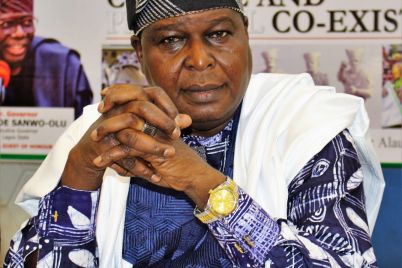
Done, dusted, and determined to signpost their commitment to the processes of democracy, 15 presidential candidates and Chairmen of the political parties in Abuja, the nation’s capital, signed the National Peace Accord. National Peace Committee (NPC) Convener, Bishop Matthew Hassan Kukah who captured the kernel of the ceremony noted that;” it looks perfunctory,
By Akindele Orimolade
Done, dusted, and determined to signpost their commitment to the processes of democracy, 15 presidential candidates and Chairmen of the political parties on Thursday in Abuja, the nation’s capital, signed the National Peace Accord.
National Peace Committee (NPC) Convener, Bishop Matthew Hassan Kukah who captured the kernel of the ceremony noted that;” it looks perfunctory, it looks formal, but it has deep implications”.
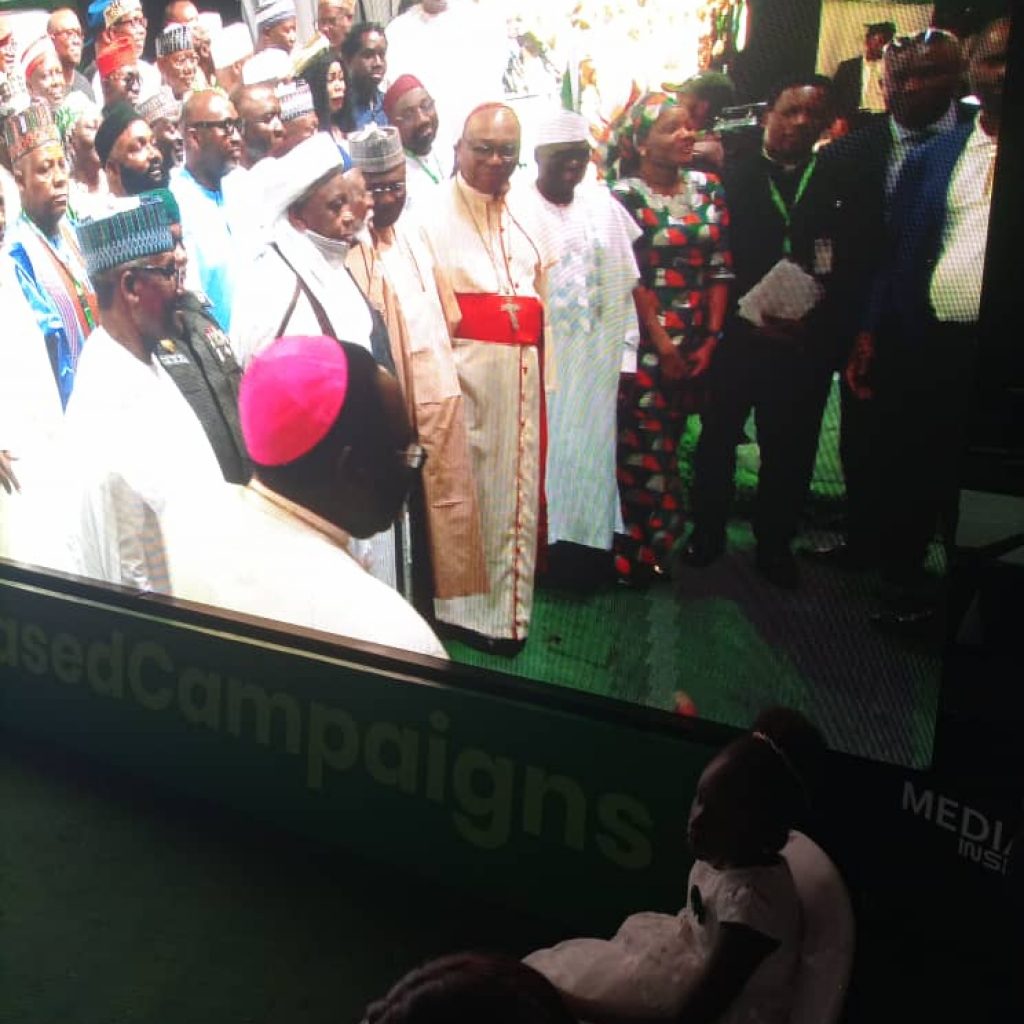
Bishop Kukah commended the Swiss government and the European Union for supporting Nigeria in deepening democratic governance. 15 political parties’ National Chairmen, their Presidential candidates, critical stakeholders in the electoral process and partners met at the International Conference Centre, Abuja where the National Chairmen of political parties and Presidential candidates signed the Peace Accord. The presidential candidate of the APC, Asiwaju Bola Tinubu was conspicuously absent along with 3 political parties that were not represented at all.
This is the third general elections that candidates and their party Chairmen would be signing the National Peace Accord. It was conceptualized in 2014 in response to emerging threats occasioned by the 2015 general elections. Candidates and their party Chairmen also signed the Peace Accord before the 2019 general elections.
Both the Inspector General of Police (IGP) Usman Alkali Baba and the Chairman of the Independent National Electoral Commission (INEC) reminded the party chieftains and Presidential candidates of the implications of any breach of the Electoral Act 2022.
Chairman of The National Peace Committee (NPC), General Abdulsalami Abubakar, a former Head of State said now that the 2023 general election is around the corner, issues of major concern that have the potential to negatively impact on the integrity of the election are emerging.
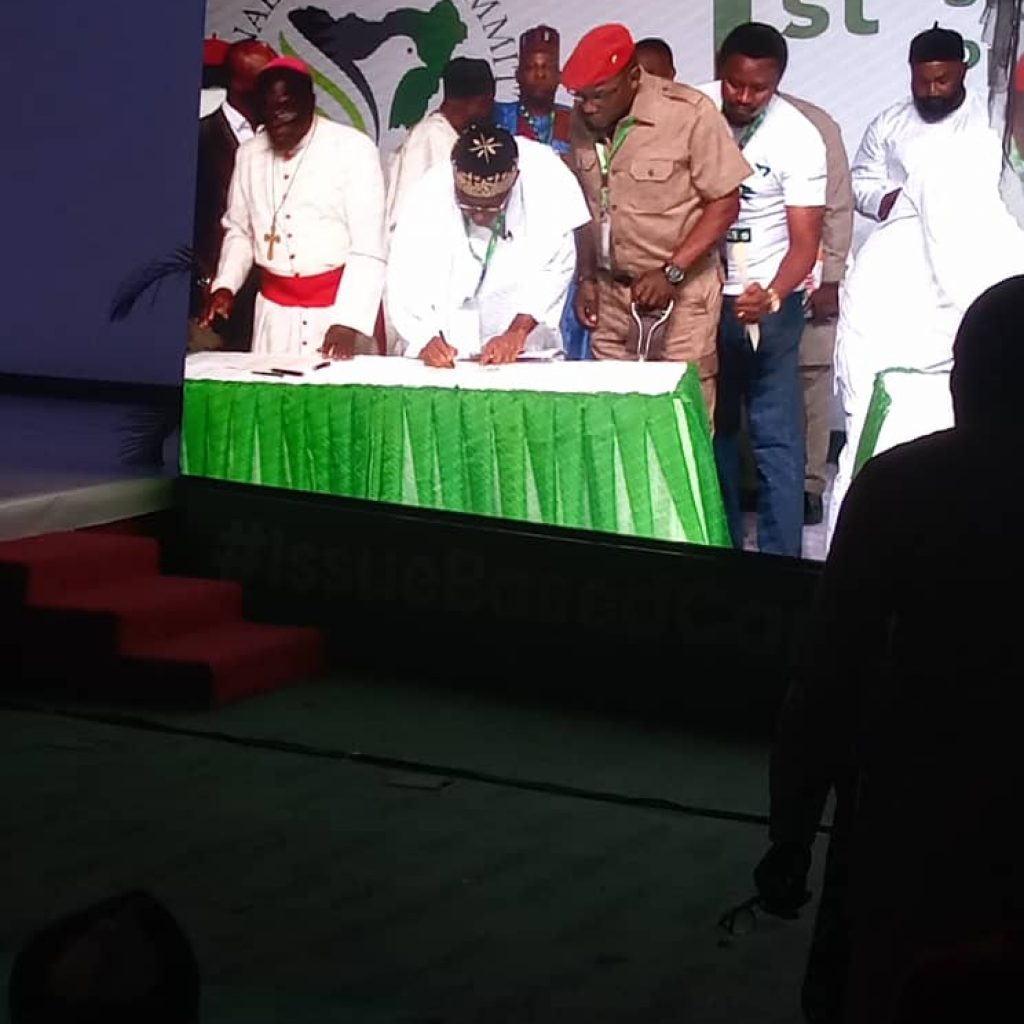
“One of such issues is the spread of fake news. Fake news and misinformation continue to pose a significant threat to the 2023 elections. Also, shift from issue-based campaign to name calling, personal insults and character assassination.
“Furthermore, it has taken away our civility and decency in public discourse and conversations and created a toxic atmosphere that has the potential to invite citizens against the state, against other political parties and candidates”, he lamented.
To address the situation, General Abubakar said the NPC would organise two Peace Accords for the 2023 general elections.
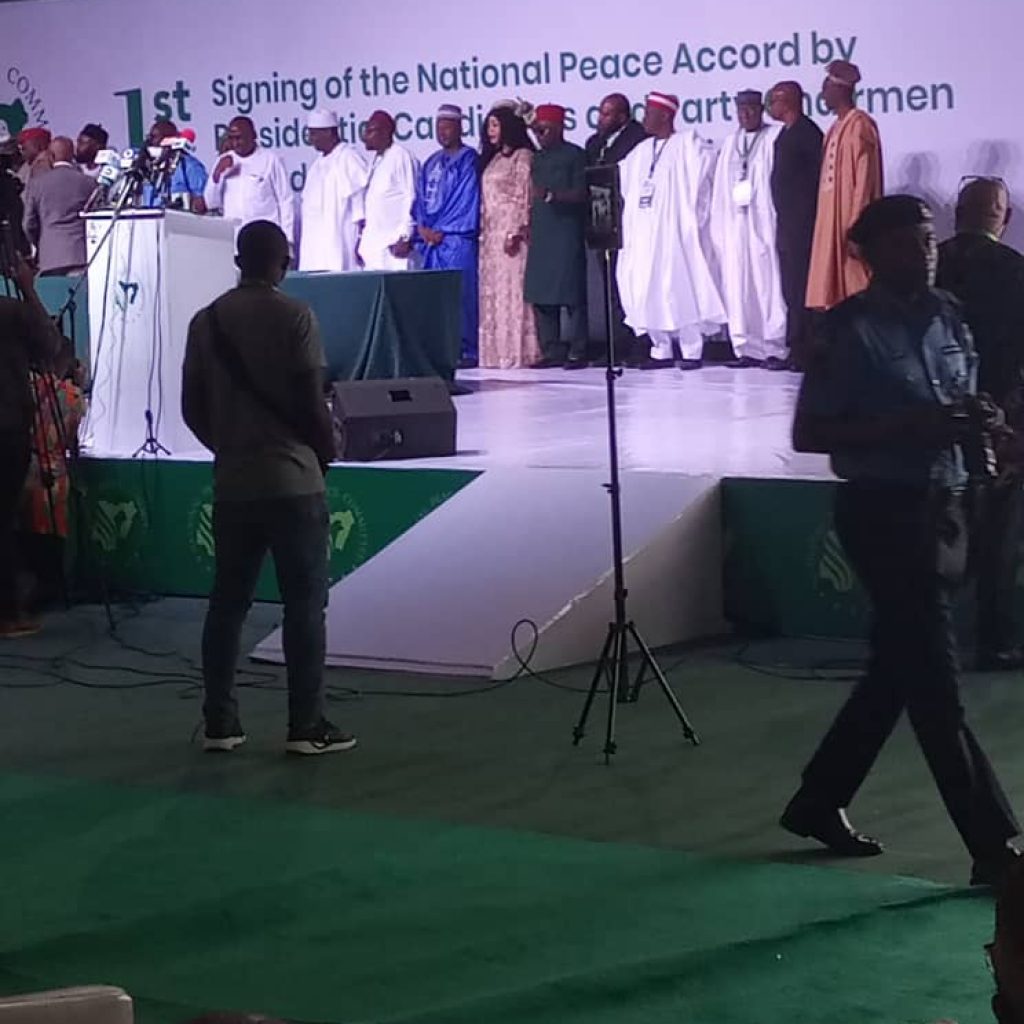
According to him, one is packaged to commit all political parties , candidates and their spokespersons to peaceful political campaigns and rallies devoid of violence, incitement and personal insults, but defined by issues at the very heart of national development and progress while the second Peace Accord would come up shortly before the elections and it is intended to commit candidates to accepting the outcome of the votes as long as it is adjudged to be free, fair and credible.
President Muhammadu Buhari in his virtual address to the occasion called on Nigerians, political parties, politicians, security agencies, the election management body (Independent National Electoral Commission, (INEC), and all stakeholders to ensure that Nigeria is placed first, above regional and sectional claims.
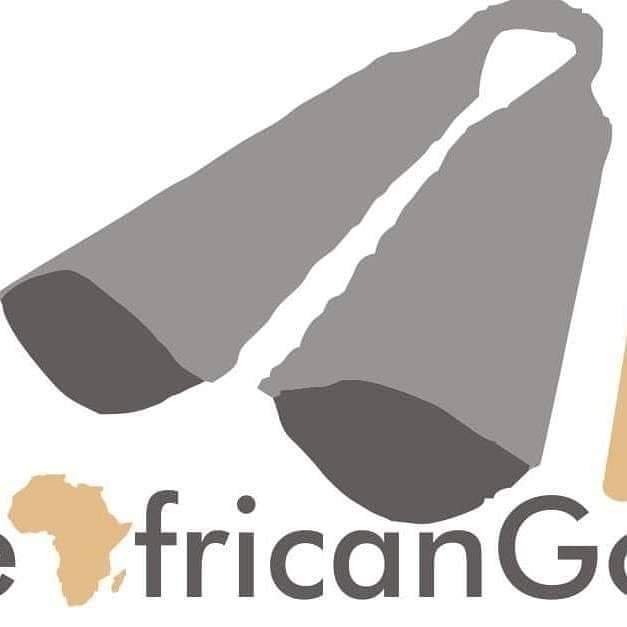
“I call on the contestants, especially their publicity agents and media advisers to shun personal attacks, avoid insults and incitement, reject the spread of fake news, and commit to issue -based campaign and political rallies”, he said.
INEC Chairman, Prof. Mahmood Yakubu said in line with the provisions of the Electoral Act 2022 and in the Commission’s determination to play its role as a regulator, it would vigorously monitor compliance to ensure that parties shun abusive, intemperate or slanderous language as well as insinuations or innuendoes likely to provoke a breach of the peace during the electioneering campaigns.
“Similarly, the Commission will also closely monitor compliance with the limits on campaign spending under the Electoral Act. There are sanctions provided by law. Political parties and candidates should study and familiarise themselves with the legal framework to avoid any infraction of the law and the unhappy consequences that will follow any act of misdemeanour
“The 2023 General Election will be conducted in 1,491 constituencies nationwide made up of one Presidential constituency,28 Governorship elections,109 Senatorial Districts,360 Federal Constituencies and 993 State Assembly constituencies.
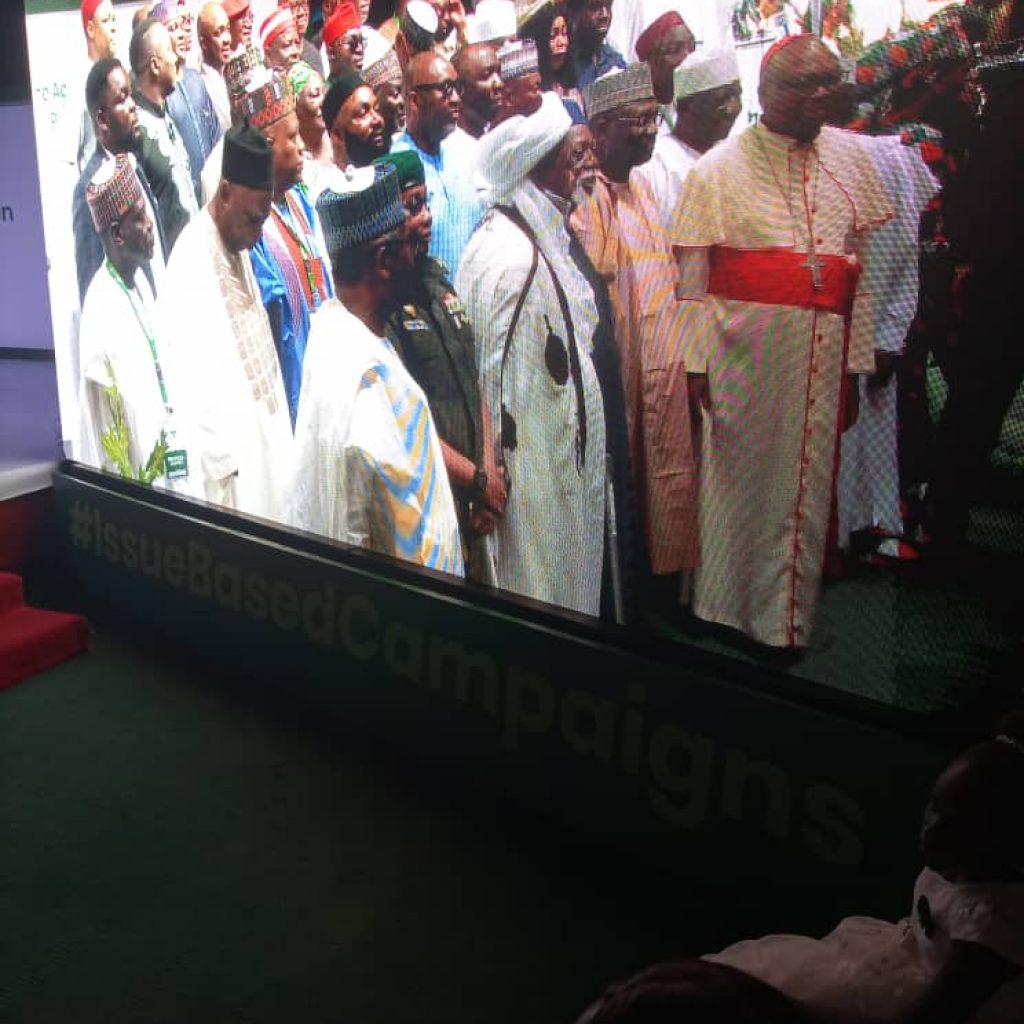
“Every constituency is important. Every election is important. Therefore,the commitment to peaceful and issue-based electioneering campaign should resonate beyond the 18party Chairmen and Presidential candidates present here today. It is not enough to simply sign the Peace Accord. What is more important is to abide by its letter and spirit.
Inspector General of Police, (IGP) Usman Alkali Baba said the significance of the Peace initiative lies in the fact that it places moral burden on political actors, trigger their sense of patriotism and challenges them to place national interests above narrow personal consideration,in the legitimate pursuit of their political ambitions.
“The use of fear and intimidation such as the use of masquerades, physical force or coercion in any form, including the retention and the use of private security organisations, groups of individuals for purpose of providing security at processions is prohibited. Section 81 of the Act and Section 227 of the Constitution of the Federal Republic of Nigeria as amended prohibits any political party or individuals from organizing, training and equipping or deploying any quasi-military group or specifically trained forces in the electioneering campaign or broad electoral process,” he warned.
Speaking further, the IGP said;” where political actors as part of the electioneering campaign process engage in hate speech, cyber bullying, false information and unguided statements that could inflame the political space as well as corrupting the electoral process through vote buying or encouraging thuggery and political violence: ballot box snatching, illegal firearms dealing to advance political motives and subvert the free will of the electorate are posing dangers to our democracy”.

He said he has directed Commissioners of the 36 states and the Federal Capital Territory, (FCT) to meet with the leadership of all political parties and the resident electoral officers in their states towards preparing a campaign schedule in a manner that will address possible cross-party conflicts in terms of date and time of campaigns, assuring them of adequate security during campaigns.
Head of delegation of European Union to Nigeria and ECOWAS, Ambassador Samela Isopi in her goodwill message recalled that in 2015, Nigeria set an example for Africa and for the world with a transition of power from one civilian administration to another one.
“It is our hope, as a long-standing partner, and supporter of Nigeria’s democratic governance, that as we move towards 2023 general elections, Nigeria will continue to take new and decisive steps to see a further consolidation to peaceful, inclusive, credible and transparent elections”, she stressed.
Some of the candidates that signed the Peace Accord were Atiku Abubakar of the Peoples Democratic Party (PDP), Peter Obi of the Labour Party, (LP) and Rabiu Kwankwaso of the New Nigeria Peoples Party (NNPP).
Others were Omoyele Sowore of African Action Congress, (AAC) Hamzat Al-Mustapha of Action Alliance, (AA) Sunday Adenuga of Boot Party, (BP) Christopher Imumolen of the Accord Party,(AP) Dan Nwanyanwu of the Zenith Labour Party (ZLP)and Dumebi Kachikwu of African Democratic Congress(ADC).
Others include Yabagi Sani of Action Democratic Party (ADP) Adewole Adebayo Ebenezer of the Social Democratic Party (SDP)and the only female candidate in the race, Chichi Ojei of Allied People’s Movement (APM). The candidate of the ruling All Progressives Congress (APC), Bola Tinubu, was represented by his running mate, Kashim Shettima.
Responding on behalf of the political parties, the Chairman of the Inter-Party Advisory Council (IPAC), Yabagi Sani, who is also the candidate of ADP, said the candidates are committed to peaceful, free, fair and credible elections.

